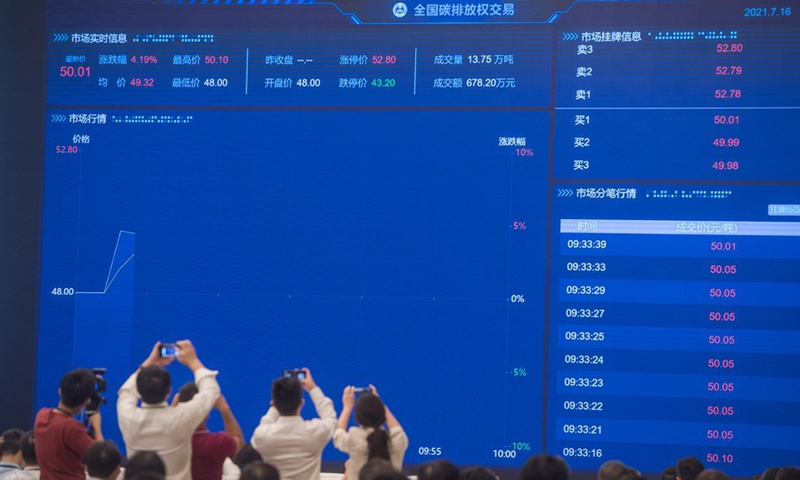Now world's largest, China marks the third anniversary of its carbon market

This July marks the third anniversary of the launch of the national carbon emissions trading market in China, which, according to the Chinese Ministry of Ecology and Environment on Monday, has made China the world's largest carbon market in terms of greenhouse gas coverage.
The national carbon emissions trading market in China, which started with the power generation industry, currently includes 2,257 key emissions units in the sector. This market covers approximately 5.1 billion tons of carbon dioxide emissions annually, said Pei Xiaofei, spokesperson of the Ministry of Ecology and Environment on Monday at a monthly press conference.
Pei said that the national carbon market is an important policy tool that uses market mechanisms to control greenhouse gas emissions and will achieve carbon peak and carbon neutrality goals. It consists of two parts: the mandatory carbon emissions trading market and the voluntary greenhouse gas emissions reduction trading market. These two markets operate independently yet complement each other through a quota clearance and offset mechanism.
He said that over the past three years, the national mandatory carbon emissions trading market has successfully completed two compliance cycles, achieved its expected construction goals and made significant progress.
A comprehensive institutional framework has been established. The State Council issued the "Interim Regulations on Administration of Carbon Emissions Trading," and the Ministry of Ecology and Environment released the "Carbon Emissions Trading Management Measures (Trial)" along with three management rules for carbon emissions registration, trading, and settlement.
An infrastructure support system known as "One Network, Two Institutions, Three Platforms" has been built, encompassing the national carbon market information network, national carbon emission registration and trading institutions, and the national carbon emissions registration, trading, and management platforms.
Moreover, the capacity for carbon emissions accounting and management has significantly improved through enhanced data quality supervision, optimized methods, advanced technologies and dynamic risk monitoring, leading to better corporate management and accounting capabilities.
The vitality of the carbon market has steadily increased. By the end of June 2024, the cumulative trading volume of the national carbon emissions trading market reached 465 million tons, with a transaction value of approximately 27 billion yuan ($3.7 billion).
The trading scale has gradually expanded, with the trading volume and value in the second compliance cycle increasing by 19 percent and 89 percent, respectively, compared to the first compliance cycle.
Furthermore, corporate participation in trading has significantly increased, with 82 percent of companies participating, up nearly 50 percent from the first compliance cycle. The overall carbon price has shown a steady upward trend, rising from 48 yuan per ton at the start to 91.6 yuan per ton ($12.6) as of the closing price on July 26, an increase of 90.8 percent.
Additionally, the national voluntary greenhouse gas emissions reduction trading market was officially launched in January 2024. Its institutional framework is now complete, and emissions reduction projects and voluntary reductions are about to enter the registration application window period, encouraging broader industry participation in carbon reduction efforts.